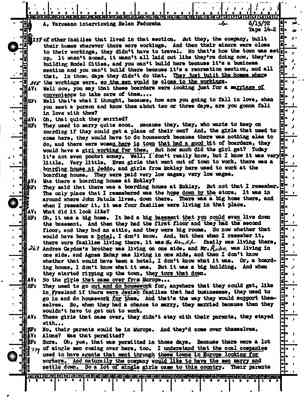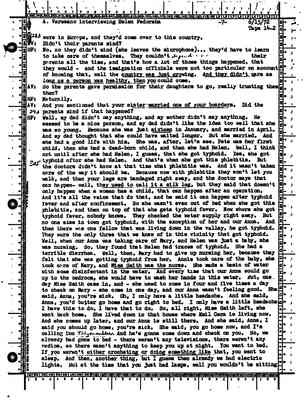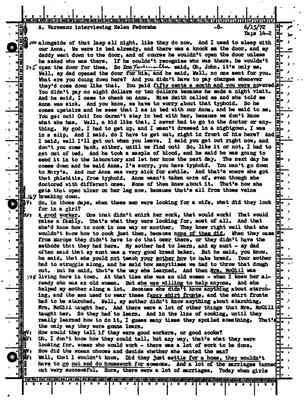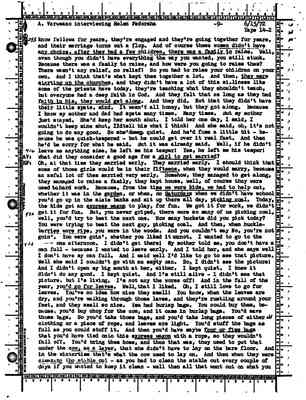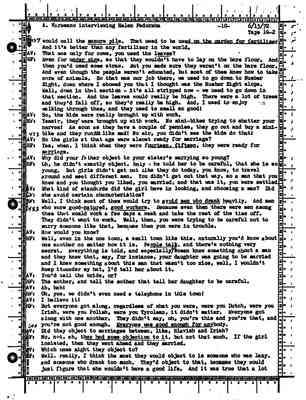Pages
8
A. Varesano interviewing Helen Fedorsha page 6 6-15-72 Tape 14-2
of families that lived in that section. But they, the company, built their homes wherever there were workings. And then their miners were close to their workings, they didn't have to travel. So that's how the town was set up. It wasn't zoned, it wasn't all laid out like they're doing now, they're building Model Cities, and you can't build here because it's a business section and you can't build there because it's a recreation section, and all that. In those days they didn't do that, They just built the homes where the workings were, so the men would be closet to the workings. AV: Well now, you say that these boarders were looking just for a marriage of convenience to take care of them....... HF: Well that's what I thought, because, how are you going to fall in love, when you meet a person and know them about two or three days, are you gonna fall in love with them? AV: Oh, that quick they married? HF: They used to marry quite soon. Because they, they, who wants to keep on boarding if they could get a place of their own? And, the girls that used to come here, they would have to do housework because there was nothing else to do, and there wer women here in town that had a good bit of boarders, they would have a girl working for them. But how much did the girl get? Today it's not even pocket money. Well, I don't really know, but i know it was very little. Very little. Even girls that went out of town to work there was a boarding house at Jeddo, and girls from Eckley here used to work at the boarding house. They were paid very low wages, very low wages. AV: Was there a boarding house at Eckley? HF: They said that there was a boarding house at Eckley. But not that I remember. The only place that I remembered was the home down by the store. It was in around wehre John Fatula lives, down there. There was a bigh home there, and when I remember it, it was four families were living in that place. AV: What did it look like? HF: Oh, it was a big home. It had a big basement that you could even live down the basement. And then they had the first floor and they had the second floor, and they had an attic, and they were big rooms. So now whether that would have been a hotel. I don't know. And, but then when I remember it, there were families living there, it was the D??? family was living there, Andrew Gaydos's brother was living on one side, and Mr. R??? was living in one side, and Agnes Zahay was livng in one side, and then I don't know whether that would have been a hotel, I don't know what it was. Or, a boarding house, I don't know what it was. But it was a big building. And when they stated ripping up the town, they tore that down. AV: So the girls that came over from Europe..... HF: They used to go out and do housework for, anywhere that they could get, like in Freeland if there were Jewish families that had businesses, they used to go in and do housework for them. And that's the way they would support themselves. So, when they had a change to marry, they married because then they wouldn't have to get out to work. AV: These girls that came over, they didn't stay with their parents, they stayed with..... HF: No, their parents would be in Europe. And they'd come over themselves. AV: Alone? Was that permitted? HF: Sure. Oh, yes, that was permitted in those days. Because there were a lot of single men coming over here, too. I understand that the coal companies used to have agents that went throught these towns in Europe looking for workers. And naturally the company would like to have the men marry and settle down. So a lot of single girls came to this country. Their parents
9
A. Varesano interviewing Helen Fedorsha Page 7 6/15/72 Tape 14-2
were in Europe, and they'd come over to this country. AV: Didn't their parents mind? HF: No, no they didnt mind (she leave the microphone) .... they'd have to learn to take care of themselves. They couldn't depend on their parents all the time, and that's how a lot of those things happened, that they would - and the imigration officials were not too particular on account of knowing that, well the country was just growing. And they didn't care as long as a person was healthy, then you could come. AV: So the parents gave permissino for their daughters to go, really trusting them then? HF: Naturally. AF: And you mentioned that you sister married one of you boarders. Did the parents mind if that happened? HF: Well, my dad didn't say anything, and my brother didn't say anything. He seemed to be a nice person, and my dad didn't like the idea too well that she was so young. Becase she was just sixteen in January, and married in April. And my dad thought that she could have waited longer. But she married. And she had a good life with him. She was, after, let's see, Pete was her first child, then she had a dead-born child, and then she had Helen. Well, I think not until afer she had Helen, I guess, that she got typhoid. Yes she got typohid after she had Helen. Anbd that's when she got this phlebitis. But the doctors didn't know at that time what phlebitis was. And it wasn't taken care of the way it should be. Because now with phlebitis they won't let you walk, and then your legs are bandaged right away, and the doctors says that can happen- well, they used to call it a milk leg, but they said that doesn't only happen when a woman has a child, that can happen after an operation. And it's all the veins that do that, and he said it can happen after typhoid fever and after confinement. So she wasn't even out of bed when she got this phlebitis, and then on top fo that she gets typhoid fever. Now where she got typhoid fever, nobody knows. They checked the water supply right away. But no one else in town got typhoid, with the exception of her and our Anna. And then there was one fellow that was living down in the valley, he got typhoid. They were the only three that we know of in this vicinity that got typhoid. Well, when our Anna was taking care of Mary, and Helen was just a baby, she was nursing. So, they found that Helen had traces of typhoid. She had a terrible diarrhea. Well, then, Mary had to give up nursing her, because they felt that she was getting typhoid from her. Annie took care of the baby, she took care of Mary, and Miss Smith was the nurse. She mad a basin of water with some disinfectant in the water. And ever time that our Anna would go up to the bedroom, she would have to wash her hands in this water. But one day Miss Smith came in, and - she used to come in four and five times a day to check on Mary - she come in one day, and our Anna wasn't feeling good. She said, Anna, you're sick. Oh, I only have a little headache. And she said, Anna, you'd better go home and go right to bed. I only have a little headache. I have this to do, I have that to do. So, all right, Miss Smith left, she went back home. She lived down in that house where Emil Gera is living now. And she comes up later, and our Anna is still there. And she said, Anna, I said you should go home, you're sick. She said, you go home now, and I'm callind Doc Trigenmiller???. And he's gonna come down and check on you. So, we already had gone to bed - there weren't any televisions, they weren't any radios, so there wasn't anything to keep you up at night. You went to bed. If you weren't either crocheting or doing something like that, you went to sleep. And then, another thing, but I guess then already we had electric lights. But at that time that you just had lamps, well you wouldn't be sitting
10
A. Varesano interviewing Helen Fedorsha Page 8 6/15/72 Tape 14-2
alongside of that lamp all night, like they do now. And I used to sleep with our Anna. We were in bed already, and there was a knock at the door, and my daddy went down to the door, and of course he wouldn't open the door unless he asked who was there. If he couldn't recognize who was there, he wouldn't open the door for them. So Doc Tuckenmiller??? said, Oh, John, it's only me. Well, my dad opened the door for him, and he said, Well, no one sent for you. What are you doing here? And you didn't have to pay charges however they'd come down like that. You paid fifty cents a month and you were covered. You didn't pay no eight dollars or ten dollars because he made a night visit. And he said, I came to check on Anna. Miss Smith called me and she told me Anna was sick. And you know, we have to worry about that typhoid. So he comes upstairs and he sees that I am in bed with our Anna, and he said to me, You get out! Out! You daren't stay in bed with her, because we don't know what she has. Well, a kid like that, I never had to go to the doctor or anything. My god, I had to get up, and I wasn't dressed in a nightgown, I was in a slip. And I said, do I have to get out, right in front of him here? And I said, well I'll get out when you leave. I (??) said you get out right now, and don't you come back, either, until we find out! So, like it or not, I had to get out of bed. And he took a sample of blood, and he said he was going to send it in to the laboratory and let her know the next day. The next day he comes down and he said Anna, I'm sorry, you have typhoid. You can't go down to Mary's. And our Anna was very sick for awhile. And that's where she got that phlebitis, from typhoid. Anna wasn't taken care of, even though she doctored with different ones. None of them knew about it. That's how she gets that open ulcer on her leg now, because that's all from those veins breaking down. AV: So, in those days, when these men were looking for a wife, what did they look for in a girl? HF: A good worker. One that didn't shirk her work, that would work! That would raise a family. That's what they were looking for, most of all. And that she'd know how to cook in one way or another. They knew right well that she wouldn't know how to cook just then, because none of them did. When they came from Europe they didn't have to do that over there, or they didn't have the methods that they had here. My mother had to learn, and my aunt - my dad often said that my aunt was a very good bread baker. But he said, you know, he said, that she would not teach your mother how to bake bread. Your mother had to struggle along, and he said how many times we had to throw that dough out. But he said, that's the was she learned. And then Mrs. McGill was living here in town. At that time she was an old woman when I knew her already she was an old woman. But she was willing to help anyone. And she helped my mother along a lot. Because she didn't know anything about starching, and the men used to wear these fancy shirt fronts, and the shirt fronts had to be starched. Well, my mother didn't know anything about starching. Mrs. McGill taught her. And there wer a lot of other things that Mrs. McGill taught her. So they had to lear. And in the line of cooking, until they really learned how to do ti, I guess many times they spoiled something. That's the only way they were gonna learn. AV: How could they tell if they were good workers, or good cooks? HF: Oh, I don't know how they could tell, but any way, that's what they were looking for, women who would work - there was a lot of work to be done. AV: How did the woman choose and decide whether she wanted the man? HF: Well, that I wouldn't know. Did they just settle for a home, they wouldn't have to go out and do housework for someone. And a lot of the marriages turned out very successful. Sure, there were a lot of marriages. Today when girls
11
A. Varesano interviewing Helen Fedorsha Page 9 6-15-72 Tape 14-2
know fellow for years, they're engaged and they're going together for years, and their marriage turns out a flop. And of course these women didn't have any choice, after they had a few children, there was a family to raise. Well, even though you didn't have everything the way you wanted, you still stuck . Because there was a family to raise, and how were you going to raise them? There wasn't any relief, no relief! So you had to raise your children on your own. And I think that's what kept them together a lot. And then, they were starting up churches, and they didn't have a lot of this silliness like some of the priests have today, they're teaching what they shouldn't teach, but everyone had a deep faith in God. And they felt that as long as they had faith in him, they would get along. And they did. Not that they didn't have their little spats, mind. It wasn't all honey, but they got along. Because I know my mother and dad had spats many times. Many times. But my mother just stayed. She'd keep her mouth shut. I told her one day, I said, I wouldn't keep mine shut, I'd tell him what I think! And she said, oh, it's not going to do any good. So she'd keep quiet. And he'd fume a little bit - because he was quick-tempered - but he could get over it real fast. And then he'd be sorry for what he said. But it was already said. Well, if he didn't leave me anything else, he left me his temper! Yes he left me his temper! AV: What did they consider a good age for a girl to get married? HF: Oh, at that time they married early. They married early. I should think that some of those girls would be in their fifteens, when they would marry, because an awful lot of them married very early. Somehow, they managed to get along, they managed to raise a family, they kept house, well, of course they were used to hard work. Because, from the time we were kids, we had to help out, whether it was in the garden, or when, on Saturdays when we didn't have school you'd go up in the slate banks and sit up there all day, picking coal. Today, the kids get an express wagon to play, for fun. We got it for work, we didn't get it for fun. But, you never griped, there were so many of us picking coal, well, you'd try to beat the next one. How many buckets did you pick today? You were trying to beat the next guy, picking coal. And then, when huckleberries were ripe, you were in the woods. And you couldn't say No, you're not goin'. You were goin' whether you liked it or not. I wanted to go to the movies one afternoon. I didn't get there! My mother told me, you don't have a can full - because I wanted to leave early. And I told her, and she says well I don't have a can full. And I said well I'd like to go to see that picture. Well she said I couldn't go with an empty can. So, I didn't see the picture! And I didn't open my big mouth at her, either. I kept quiet. I knew it didn't do any good . I kept quiet. And I'm still alive - I didn't see that picture, but I'm living. I'm not any the worse off! And in the fall of the year, you'd go for leaves. Well, that I liked. Oh, I still love to go for leaves. You've no idea how nice they smell! You know, when the leaves are dry, and you're walking through those leaves, and they're rustling around your feet and, and they smell so nice. You had burlap bags. You could buy them, because, you'd buy chop for the cow, and it came in burlap bags. You'd save those bags. So you'd take those bags, and you'd take long pieces of either clothing or a piece of rope, and leaves are light. You'd stuff the bags as full as you could stuff it. And then you'd have maybe four or five bags that you'd have tied into this express wagon with a rope, so they wouldn't fall off. You'd bring them home, and then that was, they used to put that under the cow as a layer, that she didn't have to lay on the bare floor. And in the wintertime that's what the cow used to lay on. And then when they were cleaning the stable out - as you had to clean the stable out every couple of days if you wanted to keep it clean - well then all that went out on what you
12
A. Varesano interviewing Helen Fedorsha Page 10 6/15/72 Tape 14-2
would call the manure pile. That used to be used on the garden for fertilizer and it's better than any fertilizer in the world. AV: That was only for cows, you used the leaves? HF: Even for under pigs, so that they wouldn't have to lay on the bare floor. And then you'd used some straw. But you made sure they weren't on the bare floor. And even though the people weren't educated, but most of them knew how to take care of animals. So that was our job there, we used to go down to Number Eight, down where I showed you that I though was the Number Eight slope. Well, down in that section - it's all stripped now - we used to go down in that section. And the leaves would really be high. There were a lot of trees and they'd fall off, so they'd really be high. And, I used to enjoy walking through them, and they used to smell so good! AV: So, the kids were really brought up with work. HF: Yessir, they were brought up with work. No mini-bikes trying to shatter your nevers! As soon as they have a couple of pennies, they go out and but a mini-bike and they run it like mad! No sir, you didn't see the kids do that! AV: So the girls at that sage were almost ready for marriage? HF: Oh, he didn't exactly object, only he told her to be careful, that she is so young. But girls didn't get out like they do today, you know, to travel around and meet different men. You didn't get out that way, so a man that you knew and you thought you liked, you married, and that was it, you were settled. AV: What kind of standards did the girl have in looking, and choosing a man? Did she avoid certain characteristics> HF: Well, I think most of them would try to avoid men who drank heavily. And men who were good-natured, good workers. Because even then there were men amond them that would work a few days a week and take the rest of the time off., They didn't want to work. Well, then, you were trying to be careful not to marry someone like that, because then you were in trouble. AV: How would you know? HF: Well, even in the one tonw, a small town like this, naturally you'd know about one another no matter how it is. People talk, and there's nothing very secret. Everything is told, and especially women knew something about a man and they knew that, say, for instance, your daughter was going to be married and I knew something about this man that wasn't too nice, well, I wouldn't keep it under my hat, I'd tell her about it. AV: You'd tell the bride, or? HF: The mother, and tell the mother that tell her daughter to be careful. AV: Ah, hah! HF: Oh, yes, we didn't even need a telephone in this town! AV: I believe it! HF: But everyone got along, regardless of what you were, were you Dutch, were you Irish were you Polish, were you Tyrolean, it didn't matter. Everyone got along with one another. They didn't say, oh, you're this and you're that, and you're not good enough. Everyone was good enough for anybody. AV: Did they object to marriages between, like, Slavish and Irish? HF: No, not, ah, they had some objection to it, but not that much. If the girl insisted, then they went ahaed and they married. AV: whic ones might they object to? HF: Well, really, I think the most they would object to is someone who was lazy, and someone who drank too much. They'd object to that, because they would just figure that she wouldn't have a good life. And it was true that a lot
